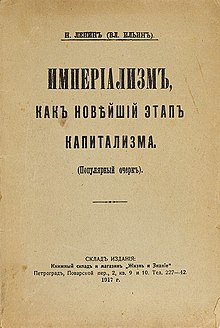Imperialism, the Highest Stage of Capitalism
This article may need to be rewritten to comply with Leftypedia's quality standards. |
Imperialism, the Highest Stage of Capitalism (Russian name: Империализм как высшая стадия капитализма, lit. Imperialism as the Highest Stage of Capitalism) is a book written by Vladimir Lenin in 1916. It analyzes how capitalism changed from its beginning to the time when the book was written, and comes to the conclusion that while the basic structures are still here, it has entered a new stage with specific characteristics. This stage, called imperialism, is characterized by monopolies and concentration of production.
Definition of imperialism
According to Lenin, imperialism has the following five main characteristics:
- Concentration of production and capital has developed to such a high stage that it has created monopolies which play a decisive role in economic life
- Merging of bank capital with industrial capital, and the creation, on the basis of this "finance capital", of a financial oligarchy
- Export of capital as distinguished from the export of commodities acquires exceptional importance
- Formation of international monopolist capitalist associations which share the world among themselves
- Territorial division of the whole world among the biggest capitalist powers is completed.
Criticizing Kautsky's definition
This section is empty. You can help by adding to it. |
Content
Concentration of production and monopolies
Competition becomes transformed into monopoly. The result is immense progress in the socialisation of production. In particular, the process of technical invention and improvement becomes socialised. [...] Production becomes social, but appropriation remains private. The social means of production remain the private property of a few. The general framework of formally recognised free competition remains, and the yoke of a few monopolists on the rest of the population becomes a hundred times heavier, more burdensome and intolerable.
— Imperialism as the Highest Stage of Capitalism, Chapter 1: Concentration of Production and Monopolies
One of the most important characteristics of imperialism, according to Lenin, is the concentration of production (already predicted by Karl Marx), the change from competition to monopoly. Under imperialism, there are no longer small producers competing on an unknown market. Almost all sources of raw material and the size of the market are known, and taken over by the monopolies. However, this does not happen in all production branches, so the overall chaoticness of the capitalist production system increases.
One aspect of this is combination. Combination is when a company combines many industrial branches, usually by doing related processes, like subsequent production or processing of by-products. These combined companies have a more stable profit, because if one branch becomes unprofitable, they still have the other branches. Also, these companies don't need to trade because they produce the required source materials, and it is easier for them to implement technical innovation. This all gives combined companies an advantage over non-combined, especially during the time of crisis.
Another aspect are cartels and trusts. When there are few dozens of companies in a branch, they can easily make agreements with each other and make competition harder. These can be done with the following methods:
- Stopping supplies of raw materials
- Stopping the supply of labour by means of "alliances" (i.e., of agreements between the capitalists and the trade unions by which the latter permit their members to work only in cartelised enterprises)
- Stopping deliveries
- Closing trade outlets
- Agreements with the buyers, by which the latter trade only with the cartels
- Systematic price cutting to ruin "outside" firms which refuse to submit to the monopolists. Millions are spent in order to sell goods for a certain time below their cost price.
- Stopping credits
- Boycott
New role of the banks
The principal and primary function of banks is to serve as middlemen in the making of payments. In so doing they transform inactive money capital into active, that is, into capital yielding a profit; they collect all kinds of money revenues and place them at the disposal of the capitalist class. As banking develops and becomes concentrated in a small number of establishments, the banks grow from modest middlemen into powerful monopolies having at their command almost the whole of the money capital of all the capitalists and small businessmen and also the larger part of the means of production and sources of raw materials in any one country and in a number of countries. This transformation of numerous modest middlemen into a handful of monopolists is one of the fundamental processes in the growth of capitalism into capitalist imperialism; for this reason we must first of all examine the concentration of banking.
— Imperialism as the Highest Stage of Capitalism, Chapter 2: Banks and Their New Role
Under imperialism, banks also undergo concentration. Not only do banks become larger, but they also get more dependencies.
Banks have a strong connection with the industrial enterprises. They can influence their decisions and determine the fate of the individual capitalists, for example by denying credit. The banks and industrial capital are also strongly connected to the government, determining the decisions of the government.
Export of capital
[...] both uneven development and a semi-starvation level of existence of the masses are fundamental and inevitable conditions and constitute premises of this mode of production. As long as capitalism remains what it is, surplus capital will be utilised not for the purpose of raising the standard of living of the masses in a given country, for this would mean a decline in profits for the capitalists, but for the purpose of increasing profits by exporting capital abroad to the backward countries. In these backward countries profits are usually high, for capital is scarce, the price of land is relatively low, wages are low, raw materials are cheap. The export of capital is made possible by a number of backward countries having already been drawn into world capitalist intercourse; main railways have either been or are being built in those countries, elementary conditions for industrial development have been created, etc. The need to export capital arises from the fact that in a few countries capitalism has become "overripe" and (owing to the backward state of agriculture and the poverty of the masses) capital cannot find a field for "profitable" investment.
— Imperialism as the Highest Stage of Capitalism, Chapter 4: Export of Capital
The exporting countries also get other advantages of exporting their capital, such as concessions and commerce treaties.
Place of imperialism in history
From all that has been said in this book on the economic essence of imperialism, it follows that we must define it as capitalism in transition, or, more precisely, as moribund capitalism.
— Imperialism as the Highest Stage of Capitalism, Chapter 10: The Place of Imperialism in History
Imperialism has heightened and made more intense the contradictions that are present in capitalism, as well as annexations and national oppression. This will cause resistance from the proletariat. Lenin sees imperialism as a transitional stage until the change to a "higher socio-economic order" (probably alluding to socialism, but, as he says to in the preface, the text was written to pass the tsarist censorship).
Meaning of imperialism for the Marxists
This section is empty. You can help by adding to it. |

